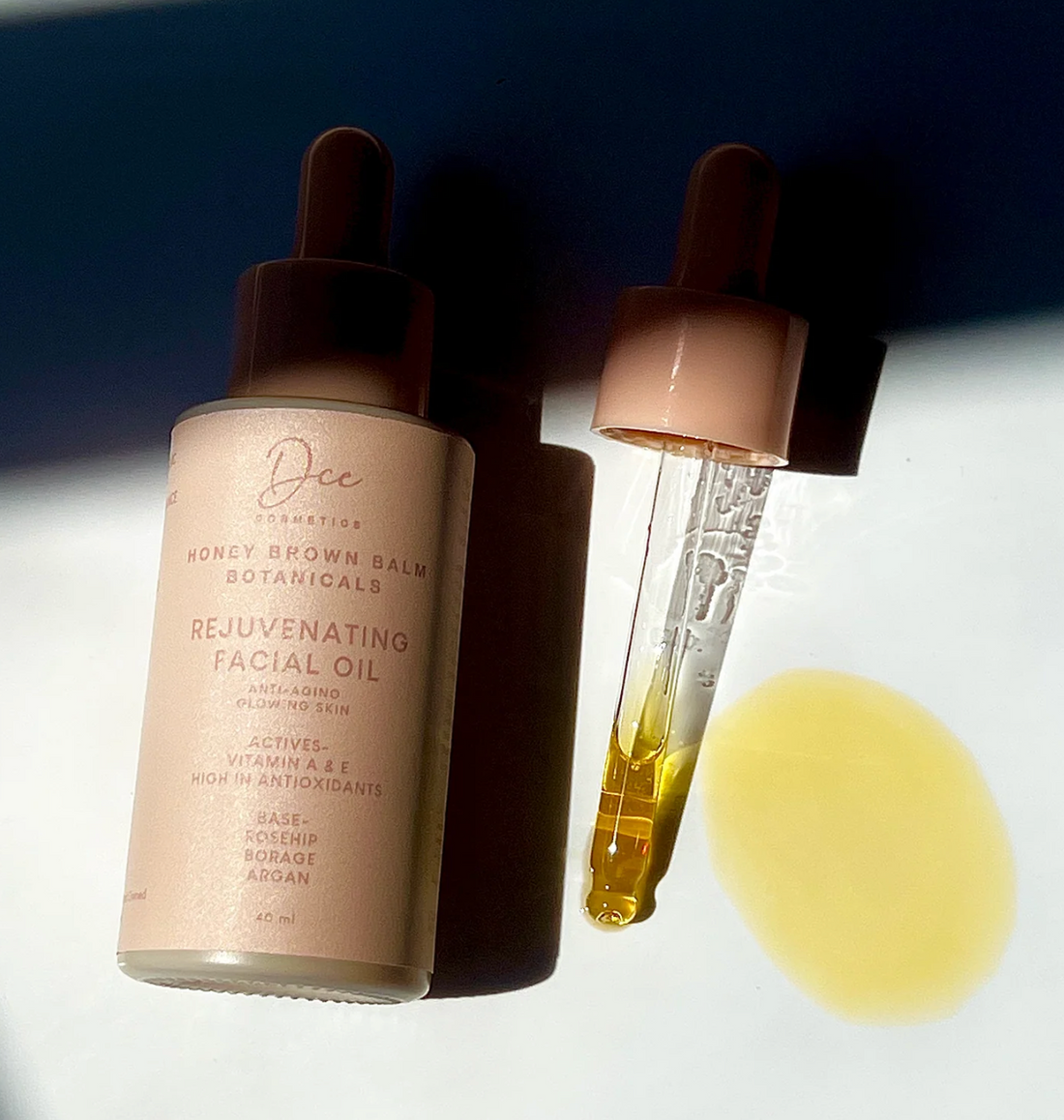What Is Facial Oil?
Facial oil, in the realm of skincare, refers to a product formulated with various oils that are specifically designed for application on the face. These oils can be derived from natural sources such as plants, nuts, and seeds, and they are often chosen for their moisturising, nourishing, and sometimes therapeutic properties. Facial oils have gained popularity in recent years due to their ability to address a wide range of skincare concerns, from dryness and dullness to fine lines and acne. Unlike moisturisers, which typically contain a mix of water and oil, facial oils are usually purely oil-based, providing a concentrated dose of hydration and nutrients to the skin.
One of the key benefits of facial oils is their ability to replenish the skin's natural lipid barrier, which can become compromised due to factors like harsh weather, pollution, and the use of drying skincare products. By restoring this barrier, facial oils help to lock in moisture and prevent water loss, leading to softer, smoother, and more supple skin. Additionally, many facial oils contain antioxidants and vitamins that can help protect the skin from environmental damage and promote a more youthful appearance.
Facial oils come in a variety of formulations to suit different skin types and preferences. Some are lightweight and fast-absorbing, making them suitable for oily or combination skin, while others are richer and more nourishing, ideal for dry or mature skin. They can be used alone as a standalone moisturiser or layered over a water-based serum or moisturiser to seal in hydration. With their versatility and ability to deliver potent nutrients directly to the skin, facial oils have become a beloved staple in many skincare routines, offering a luxurious and effective way to achieve healthy, glowing skin.

What Is The Difference Between Day and Night Facial Oil?
Day and night facial oils are skincare products formulated with different ingredients and purposes to cater to the specific needs of the skin during the day and at night. Day facial oils are typically lighter in texture and formulated to provide hydration and nourishment without leaving a heavy or greasy residue on the skin. They often contain ingredients like lightweight plant oils such as jojoba or grapeseed oil, along with antioxidants such as vitamin C or green tea extract to help protect the skin from environmental stressors like pollution and UV rays. Day facial oils may also include ingredients that help to mattify the skin or control excess oil production, making them suitable for wearing under makeup.
In contrast, night facial oils are often richer and more emollient, formulated to deeply hydrate and repair the skin while it rests and rejuvenates overnight. These oils may contain heavier oils like avocado or rosehip seed oil, which are rich in fatty acids and vitamins to nourish and replenish the skin. Night facial oils may also include ingredients like retinol or peptides, which work to stimulate collagen production and promote cell turnover, leading to smoother, firmer skin over time. Because they are not intended to be worn under makeup, night facial oils can be more occlusive, creating a protective barrier on the skin to lock in moisture and enhance the skin's natural repair processes.
The main difference between day and night facial oils lies in their formulation and intended use. Day facial oils focus on providing lightweight hydration and protection against environmental stressors, while night facial oils are designed to deliver intensive nourishment and repair to the skin while it sleeps. By incorporating both day and night facial oils into a skincare routine, individuals can address their skin's needs around the clock, ensuring it remains healthy, balanced, and radiant throughout the day and overnight.
Can Facial Oil Cause Acne?
Facial oils, while generally beneficial for many skin types, can potentially contribute to acne breakouts in some individuals. The likelihood of facial oils causing acne largely depends on the type of oil used and the unique characteristics of an individual's skin. Certain oils have a higher comedogenic rating, meaning they are more likely to clog pores and contribute to the formation of acne lesions. For example, oils such as coconut oil and cocoa butter have a higher comedogenic rating and may exacerbate acne in some people, particularly those with oily or acne-prone skin.
Moreover, the way facial oils are applied and incorporated into a skincare routine can also influence their potential to cause acne. Overuse or improper application of facial oils, such as applying too much product or not properly cleansing the skin beforehand, can lead to pore congestion and breakouts. However, it's important to note that not all facial oils will cause acne, and many individuals with acne-prone skin find that certain non-comedogenic oils, such as jojoba or rosehip seed oil, can actually help to balance sebum production and improve the overall health of their skin. As with any skincare product, it's essential to choose facial oils wisely and to monitor how your skin responds to ensure they are not exacerbating acne or other skin concerns.
How Can I Prevent Facial Oil’s Potential Risks?
To minimise the potential risks associated with using facial oils, there are several proactive steps you can take. Firstly, opt for facial oils that are labelled as non-comedogenic, meaning they are less likely to clog pores and contribute to acne breakouts. Look for oils with a lower comedogenic rating, such as jojoba, argan, or squalane oil, which are less likely to exacerbate acne or pore congestion. Additionally, perform a patch test before applying a new facial oil to your entire face. Apply a small amount of the oil to a discrete area of your skin, such as the inner forearm, and monitor for any adverse reactions, such as redness, itching, or breakouts, for at least 24 hours before using it on your face.
Furthermore, practice moderation when using facial oils to prevent potential risks. Use only a small amount of oil, typically a few drops, and avoid over-application, which can lead to pore congestion and breakouts. Incorporate facial oils into your skincare routine gradually, starting with once or twice a week and adjusting frequency based on how your skin responds. Additionally, ensure your skin is clean and properly prepared before applying facial oil by cleansing thoroughly and removing any makeup or impurities. By being mindful of the type of oil you choose, performing patch tests, using moderation, and maintaining good skincare habits, you can help minimise the potential risks associated with facial oil use and enjoy its benefits for healthier, radiant skin.

Where Can I Order Best Quality Facial Oil Online?
One reputable option for ordering high-quality facial oil online is DCE COSMETICS, an Australian-made company known for its commitment to creating premium skincare products using natural and ethically sourced ingredients. DCE COSMETICS offers a range of facial oils formulated to address various skin concerns, from hydration and anti-aging to acne-prone and sensitive skin. Their products are carefully crafted with potent botanical extracts, nourishing oils, and vitamins to deliver effective results while remaining gentle on the skin.
DCE COSMETICS' dedication to quality and transparency is evident in their product formulations, which are free from harsh chemicals, parabens, and artificial fragrances. Customers can trust in the integrity of DCE COSMETICS' facial oils, knowing that they are made with the highest standards of safety and efficacy. Additionally, the company provides detailed information about each product's ingredients and benefits, allowing customers to make informed choices based on their skincare needs. With convenient online ordering and worldwide shipping options, DCE COSMETICS makes it easy for individuals to access premium-quality facial oils that promote healthy, radiant skin. For more information please contact us.


